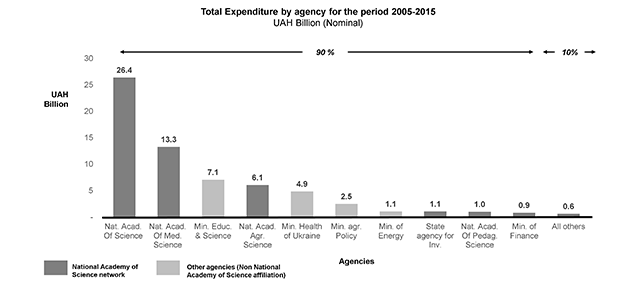Ukraine is not a newcomer to the world of science and technology. One positive legacy from the country’s Soviet history is a talented and technically qualified workforce that persists even today. Eighty percent of 19-25 year-old Ukrainians are enrolled in universities, the country has one of the largest pools of IT developers and programmers in the world – 90,000 strong – and its high-skilled diaspora has spread through Europe and North America. As a result, the country has a booming ICT sector, estimated at $2.5 billion in exports in 2015, and is home to globally competitive startups such as Looksery, which was bought by Snapchat for $150 million in 2015, PetCube, and others. On the surface, the country has the ingredients and the potential to be an innovation-driven economy.

But the challenges persist and are deeply entrenched…
Ukraine’s scientific and technical capacity has yet to be reflected in widespread adoption of technology and innovative practices by its existing firms. This lagging performance of the private sector is evident in the country’s low standards of living, average income, and less than impressive rankings on global innovation and competitiveness indices, especially when compared to benchmark countries.
Over the last year, our Trade & Competitiveness technical assistance team has taken a systemic look at the ecosystem factors that hinder the Ukrainian firms’ ability to innovate. Our four analytical reports on Ukraine’s innovation and entrepreneurial ecosystem, its public expenditures on science, technology and innovation (STI), the technology transfer framework, and fiscal incentives for supporting STI, points out that many of the factors that affect innovation in Ukraine are structural and institutional.
Firms’ innovative capacities, especially SMEs and young firms, are constrained by high risks to doing business, including corruption, uncertainties due to war and political instability, uncompetitive domestic markets dominated by large state-owned enterprises and old industrial structures, and outdated technical standards and regulations. In addition, the Ukrainian innovation ecosystem suffers from: (i) lack of common vision and institutional fragmentation that impede the design and implementation of innovation policy; (ii) a shrinking, inefficient, and biased STI public support characterized by block funding to the National Academies of Ukraine (NASU) which consumes more than half of the STI budget with little impact on market innovation and a marginal role played by universities R&D; (iii) low levels of research commercialization, weak collaboration between research and academic institutions and the industry, and nonexistent support to enterprise innovation and technology transfer activities.

The pathway through innovation policy reforms
It is evident that for Ukraine to progress towards an innovation-driven and high value-added economy, it must reform its innovation and entrepreneurial ecosystem. To assist the government, our Innovation Policy Technical Assistance team has developed a set of strategic goals and recommendations for implementation in the short- and medium- terms as a preliminary roadmap for innovation policy reforms. Efforts to strengthen the rule of law and reduce corruption, improve regulations, competition, business and investment environment, are essential to strengthening innovation. Some progress has been made, the country improved its Doing Business ranking from 87 to 76 between 2015-18. In addition to addressing the general macroeconomic framework conditions, there is an immediate need for improving the governance, coordination, and implementation of innovation policy at both the national and regional levels, including the reform and introduction of policies and support instruments related to the research and business sectors as well as entrepreneurship support and technology transfer organizations.
Ukraine is not the first country to go through such transformation and will not be the last. Neighboring Poland to the east, Lithuania to the north, and many others have already made strides and are building capacity at their public institutions to design, monitor, and evaluate their innovation policies and programs. Some efforts succeeded where the others failed. Ukraine has a unique opportunity to learn from these successes, avoid pitfalls, and leverage the support and expertise of its partners, supporters, and the private sector.
The pathway towards these reforms starts with a declared commitment, at the highest levels of government, to send a clear message to entrepreneurs, firms, and investors that Ukraine is serious about innovation. The country needs to engage its stakeholders and ecosystem builders to articulate an ambitious vision ( where will Ukraine be in 10 years?) and a strategy to achieve it. Ensuring the coordination and complementarity of initiatives, scaling existing successful efforts, and exercising selectivity and piloting of new ones are key guiding principles for successful innovation policy. To build momentum and trust between the business community and government, it would be practical to scale existing successful programs and expand regional initiatives where it is often easier for local stakeholders to work together.
The question persists, will Ukraine’s talented scientists, engineers, and entrepreneurs be able to transform their economy’s performance and give rise to a prosperous future? No doubt they will, but the government will need to pave the way.
For more information, please see the recent WB reports on Ukraine’s innovation ecosystem here:


Join the Conversation